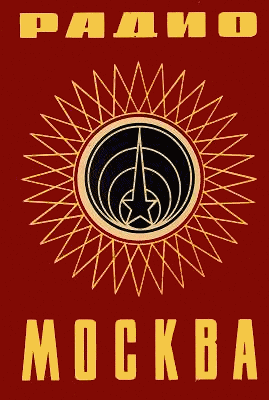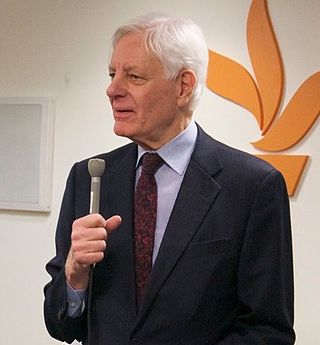
Voice of America is the state-owned news network and international radio broadcaster of the United States of America. It is the largest and oldest of the U.S.–funded international broadcasters. VOA produces digital, TV, and radio content in 48 languages, which it distributes to affiliate stations around the world. Its targeted and primary audience is non-American.
International broadcasting, in a limited extent, began during World War I, when German and British stations broadcast press communiqués using Morse code. With the severing of Germany's undersea cables, the wireless telegraph station in Nauen was the country's sole means of long-distance communication.

Radio Free Europe/Radio Liberty (RFE/RL) is a United States government funded media organization that broadcasts and reports news, information, and analysis to countries in Eastern Europe, Central Asia, the Caucasus, and the Middle East where it says that "the free flow of information is either banned by government authorities or not fully developed". RFE/RL is a private, non-profit 501(c)(3) corporation supervised by the U.S. Agency for Global Media, an independent government agency overseeing all U.S. federal government international broadcasting services. Jeremy Bransten is acting editor-in-chief of RFE.

Radio Moscow, also known as Radio Moscow World Service, was the official international broadcasting station of the Union of Soviet Socialist Republics until 1993, when it was reorganized into Voice of Russia, which was subsequently reorganized and renamed into Radio Sputnik in 2014. At its peak, Radio Moscow broadcast in over 70 languages using transmitters in the Soviet Union, Eastern Europe, and Cuba.
Shortwave broadcasting in the United States allows private ownership of commercial and non-commercial shortwave stations that are not relays of existing AM/MW or FM radio stations, as are common in Africa, Europe, Asia, Oceania except Australia and Latin America. In addition to private broadcasters, the United States also has government broadcasters and relay stations for international public broadcasters. Most privately owned shortwave stations have been religious broadcasters, either wholly owned and programmed by Roman Catholic and evangelical Protestant charities or offering brokered programming consisting primarily of religious broadcasters. To better reach other continents of the world, several stations are located in far-flung US territories. Shortwave stations in the USA are not permitted to operate exclusively for a domestic audience; they are subject to antenna and power requirements to reach an international audience.

The Salang Pass is the primary mountain pass connecting northern Afghanistan with Parwan Province, with onward connections to Kabul Province, southern Afghanistan, and to the Pakistani province of Khyber Pakhtunkhwa. Located on the border of Parwan Province and Baghlan Province, it is just to the East of the Kushan Pass, and both of them were of great importance in early times as they provided the most direct connections between the Kabul region with northern Afghanistan or Tokharistan. The Salang River originates nearby and flows south.

Farhad Darya is an Afghan singer, composer, music producer, and philanthropist. Active since the 1980s, Darya has been one of the most renowned and influential Afghan pop musicians of the modern era, contributing to establishing new wave in Afghanistan and blending urban and rural styles. Darya's career has spanned multiple genres - including semi-classical ghazal, pop, folk, and rock - as well as both his native languages Dari Persian and Pashto as well as Uzbek, Hindi and English.

Parcham was the more moderate socialist faction of the People's Democratic Party of Afghanistan (PDPA) led by Babrak Karmal. It was later turned into the Watan (Homeland) Party with a more Islamic outlook under Mohammed Najibullah. The faction was formed directly after the founding of the Party in 1965 following ideological splits in the PDPA. While the Parchamites' stressed the need for swift social-economic reforms to achieve revolution, this was in direct contrast with their PDPA rivals, the Khalqists, who sought an immediate and violent overthrow of the government. Karmal believed that Afghanistan was not developed enough for a Leninist revolutionary approach and instead sought a patriotic and anti-imperialist united front to take the next steps toward revolution.

Radio Farda is the Iranian branch of the U.S. government-funded Radio Free Europe/Radio Liberty (RFE/RL) external broadcast service for providing "factual, objective and professional journalism" to its audiences. It broadcasts 24 hours a day in the Persian language from its headquarters in the district Hagibor of Prague, Czech Republic.

Kevin Klose is an American journalist, author, broadcast executive, and academic administrator, who served as president of National Public Radio for almost a decade, overseeing a major growth era for the service.
The International Broadcasting Bureau (IBB) is the technical support outlet within the United States Agency for Global Media (USAGM), which is a U.S. independent agency. The IBB supports the day-to-day operations of Voice of America (VOA) and the Office of Cuba Broadcasting. It also provides transmission and technical support for all of the independent non-military broadcasting services funded by the USAGM. The IBB is located in Washington, D.C.

TOLO is a commercial television station operated by MOBY Group in Afghanistan. Launched in 2004, it became one of the first commercial stations in the country and laid the foundation for an accessible media outlet by offering a large library of shows. Being a Dari Persian language channel, it is one of the most popular television channels in Afghanistan.
The mass media in Afghanistan is monitored by the Ministry of Information and Culture (MoIC), and includes broadcasting, digital and printing. It is mainly in Dari and Pashto, the official languages of the nation. It was reported in 2019 that Afghanistan had over 107 TV stations and 284 radio stations, including 100s of print media and over 1,800 online media outlets. After the return of the Islamic Emirate of Afghanistan (IEA) in 2021, there was a concern that the mass media will significantly decrease in the country. The number of digital media outlets is steadily increasing with the help of Facebook, Instagram, TikTok, Twitter, YouTube, and other such online platforms. IEA's spokesman Zabihullah Mujahid suggested that the media should be in line with Sharia and national interests.

Kabul Medical University formerly known as Kabul Medical Institute) is located in Kabul, Afghanistan on the campus of Kabul University. The medical institution was initially maintained by collaboration with the Turkish and French sponsors. KMF developed into a single autonomous University in 2005. KMU is a coeducational center with below 1000 enrolment. It currently graduates professionals in fields of Curative Medicine, Pediatric, Stomatology, Dental and Nursing. In 2012 two new departments of Medical Technology and Anesthesia were also added. All subjects are taught in Dari and Pashto but most medical terms are in English.
Radio Free Iraq was a 24-hour radio station broadcasting in Arabic from Prague, Czech Republic, and directed to Iraq and the Iraqi diaspora. It started its broadcasts on 30 October 1998 and was part of the programming of Radio Free Europe/Radio Liberty (RFE/RL), which is funded by the United States Congress. The radio station also ran an online edition which had regularly updated news and reports in Arabic.
Radio propaganda is propaganda aimed at influencing attitudes towards a certain cause or position, delivered through radio broadcast. The power of radio propaganda came from its revolutionary nature. The radio, like later technological advances in the media, allowed information to be transmitted quickly and uniformly to vast populations. Internationally, the radio was an early and powerful recruiting tool for propaganda campaigns.

The United States International Programming to Ukraine and Neighboring Regions is a law that authorizes the federal government to spend $10 million on programming for Radio Free Europe/Radio Liberty and the Voice of America to be broadcast into Ukraine. The goal of the increased funding would be to combat the Russian "propaganda" into the Crimean peninsula, which had been illegally annexed by Russia in 2014, provoking international condemnation and severe economic sanctions against Russia.

Current Time TV is a Russian-language television channel with editorial office in Prague, created by the US organisations Radio Free Europe/Radio Liberty and Voice of America. The channel – via RFE/RL – is funded through grants from the US Congress through the US Agency for Global Media. The media sees its task in "promoting democratic values and institutions". RFE/RL launched Current Time, in October 2014. The official round-the-clock broadcasting began on February 7, 2017.
Qari Fasihuddin Fitrat is an Afghan military commander who is the Chief of the General Staff of the Armed Forces of the Islamic Emirate of Afghanistan. He has been a senior member of the Taliban.












